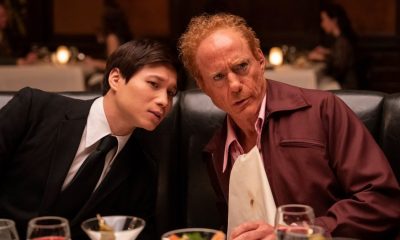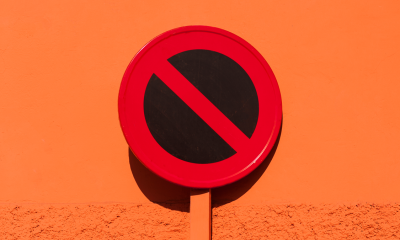Entertainment
Netflix’s ‘The Confession Killer’ digs for the truth: Review

In 1960, Henry Lee Lucas murdered his mother, Viola. After serving , Lucas claimed to have murdered hundreds of people all across the country between his release in 1975 and his arrest for the murder of Kate Rich in 1983.
The Confession Killer, Netflix’s latest true crime docuseries, examines the truth behind the gruesome narrative Lucas conceived while in custody for Rich’s murder in Georgetown, Texas and exposes the gross mishandling of Lucas’s confessions by Texas law enforcement.
While in custody and under the authority of Sheriff Jim Boutwell, Lucas confessed to the murders of hundreds. A majority of Lucas’s alleged victims were women. In response to the outpouring of confessions, Boutwell, a Texas Ranger, created a task force to facilitate connecting Lucas’s confessions to hundreds of other murders all over the United States.
Lucas with Texas Ranger Phil Ryan.

The Georgetown task force and Lucas, a convicted murderer, acted as a team performing a widespread public service: With each confession, Lucas closed a case that had gone cold and delivered a semblance of closure to the grieving families of victims. In 1985, the Chicago Tribune that “investigators [were] amazed at [Lucas’s] cooperative attitude and his miraculous memory,” which was thought to have “kept him from the lethal injection of the Texas executioner’s needle for some time.”
For true crime devotees, watching the five-part series will do more than hit the spot. Throughout the first four episodes in particular, The Confession Killer has so many twists and turns that it is slightly hard to keep up with Henry Lee Lucas’s unraveling fate. Filmmakers Robert Kenner, Taki Oldham, and Melissa Robledo tactfully introduce each development and utilize gasp-inducing cliffhangers to keep viewers on the edge of their seats.
After Lucas had confessed to committing over 350 murders all over the continental United States, Dallas journalist took a closer look at Lucas’s alleged timeline, and realized it didn’t add up: Based on Lucas’s confessions in which he claimed to have killed victims thousands of miles apart in the span of one or two days, Lucas would have had to drive without stopping for gas or sleep for days on end… only to turn around and drive another thousand miles after each killing. While such a cross-country trek is humanly possible, it isn’t probable.
Hugh Aynesworth speaks to his role in exposing Henry Lee Lucas’s false confessions.

Thus began Aynesworth’s investigation into the Georgetown task force, a group of law enforcement officers that seemed to be more interested in their own prestige and name recognition than the actual solving of crimes. And of course, there’s much more to the gruesome tale already described.
Notably, The Confession Killer also acts as a sort of retribution for the families of victims who were misled by the Georgetown task force. The docuseries drives home the point that Lucas’s actions, as a mass murderer and/or pathological liar, directly impacted the lives and emotions of countless others.
Families of victims, and specifically members of the group Victims of Lucas Tragedies, are prominently featured in each episode to speak to their experience of losing a loved one and subsequently being jostled around by law enforcement officers who wrongly accepted Lucas’s confessions as fact. After dedicating a majority of The Confession Killer’s airtime to tapes of interviews with Lucas and the meticulous dissection his mental state, the series serves some justice in spotlighting the families of victims.
The docuseries serves some justice in spotlighting the families of victims.
As sensationalized as The Confession Killer is, it explores questions and dilemmas of , an issue that is ever-pressing and relevant. By using Lucas’s plentiful confessions to close cases without stringent confirmation of their accuracy, the law enforcement officers involved with Lucas were not providing effective (or accurate) service to their local communities and the nation at large. Furthermore, even when attempted to hold the Georgetown task force and Texas Rangers accountable, they retaliated.
Relatedly, the show points out that crime control has improved tenfold with the advent of DNA forensic technology .
Joyce Lemons holds a photo of her daughter, Debbie Sue Willamson, who Lucas falsely confessed to having murdered.

Although Lucas falsified a vast majority the details and motives pertaining to the murders he purported to commit, hearing his monologues about viscerally hating women is still affecting and horrifying to viewers. On that note, it’s worth mentioning that The Confession Killer isn’t for the faint of heart; it will very likely make your stomach turn.
Filmmakers briefly feature Nan Cuba, during his stay with the task force, as she explains how terrified she felt speaking to a man who called himself a woman-hating mass murderer. As one of the only women amidst such a boys club, Cuba recalls feeling shocked that Lucas lounged without handcuffs and was brought strawberry milkshakes in exchange for his confessions. However, her concise commentary just isn’t enough.
Mass murderer or not, Lucas’s rhetoric is undeniably the product of the patriarchy (albeit an extreme outlier). Furthermore, his partnership with the Georgetown task force was ostensibly based on some sort of fraternal bond with the Texas Rangers. I would have liked to see filmmakers spotlight both of those realities in the same way the docuseries made sure to touch on the other key issues.
The Confession Killer is now available to stream exclusively on Netflix.
-

 Business7 days ago
Business7 days agoFormer top SpaceX exec Tom Ochinero sets up new VC firm, filings reveal
-

 Business6 days ago
Business6 days agoConsumer Financial Protection Bureau fines BloomTech for false claims
-

 Business4 days ago
Business4 days agoLangdock raises $3M with General Catalyst to help businesses avoid vendor lock-in with LLMs
-

 Entertainment4 days ago
Entertainment4 days agoWhat Robert Durst did: Everything to know ahead of ‘The Jinx: Part 2’
-

 Business6 days ago
Business6 days agoKlarna credit card launches in the US as Swedish fintech grows its market presence
-

 Entertainment3 days ago
Entertainment3 days agoThis nova is on the verge of exploding. You could see it any day now.
-

 Entertainment7 days ago
Entertainment7 days agoHow to watch ‘The Sympathizer’: Release date and streaming deals
-

 Entertainment6 days ago
Entertainment6 days agoHow to set boundaries in the early stages of dating






















